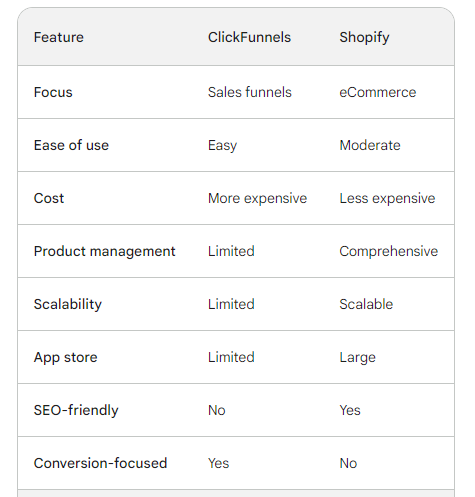Picking between ClickFunnels and Shopify is a big deal for your online store. Each has its own good points and not-so-good points. If you’re thinking about which one will help you sell more and grow your business, we’ve got the scoop. Let’s look at ClickFunnels vs Shopify closely to see which one could be the winner for your shop.
What are they?
ClickFunnels: ClickFunnels is a sales funnel builder designed to help you create and optimize conversion-focused landing pages, sales funnels, and membership sites. It’s not a traditional eCommerce platform, but it can be used to sell products and services.
Shopify: Shopify is a dedicated eCommerce platform that makes it easy to set up and manage an online store. It offers a wide range of features, including product listings, shopping cart, payment processing, shipping, and marketing tools.
Strengths of ClickFunnels:
Focus on conversions: ClickFunnels is all about creating high-converting sales funnels. It provides a drag-and-drop editor, pre-built templates, and analytics tools to help you optimize your funnels for maximum conversions.
Easy to use: ClickFunnels is designed to be easy to use, even for beginners. You don’t need any coding knowledge to create beautiful and effective sales funnels.
All-in-one solution: ClickFunnels includes everything you need to build and manage a sales funnel, from landing pages and order forms to email marketing and membership sites.
Weaknesses of ClickFunnels:
Limited product management: ClickFunnels is not as good at managing products and inventory as Shopify. It doesn’t have features like product variations, discounts, or coupons.
Higher cost: ClickFunnels is more expensive than Shopify, especially when you consider the need for additional tools to manage products and inventory.
Not a true eCommerce platform: ClickFunnels is not designed to be a full-fledged eCommerce platform. It’s best for businesses that focus on selling digital products or services, not physical products.
Strengths of Shopify:
Comprehensive eCommerce platform: Shopify has everything you need to run a successful online store, from product listings and inventory management to shipping and marketing tools.
Scalable: Shopify can scale with your business. You can start with a simple store and add more features as you grow.
Large app store: Shopify has a huge app store with thousands of add-ons that can extend the functionality of your store.
SEO-friendly: Shopify is built to be SEO-friendly, which can help you get more organic traffic to your store.
Weaknesses of Shopify:
Learning curve: Shopify has a steeper learning curve than ClickFunnels. It takes some time to learn all the features and get comfortable using the platform.
Not as conversion-focused: Shopify is not as focused on conversions as ClickFunnels. You’ll need to use additional tools or apps to build and optimize your sales funnels.
Transaction fees: Shopify charges transaction fees on all sales. These fees can add up over time, especially if you have a high volume of sales.
Which platform is right for you?
The best platform for you depends on your specific needs and goals. If you’re focused on selling digital products or services and want to create high-converting sales funnels, ClickFunnels may be a good option. If you want a comprehensive eCommerce platform that can grow with your business, Shopify is the better choice.

To really figure out which platform suits you best, why not give them a go? Both ClickFunnels and Shopify offer free trials for this purpose. And for a deeper dive, check out our comprehensive guides: explore the battle of features and usability in Stan Store vs Shopify: 2024 Ultimate Guide, understand the nuances between sales funnel and content management with ClickFunnels vs WordPress: 2024 Ecommerce Platform Choice, and master integration with Integrate Shopify with HighLevel: A Step-by-Step Guide. These resources are designed to give you clarity and direction in setting up the perfect eCommerce environment.
I hope this comparison helps you choose the right platform for your eCommerce business!
